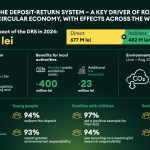
Claiming to be sustainable is no longer enough …
Foto: minervastock / depositphotos.com
Bucharest – 12 December 2022. Would you invest in a business which is not sustainable? The question may at first sight seem absurd – surely in these days all businesses should be sustainable? Surprising as it may seem, the answer is “not necessarily” or at least “not necessarily in all respects”.
Some businesses are clearly not “for ever” from the outset. The most obvious example of these are the extractive industries: exploitable resources are finite. Would anyone invest in such a business? At the start of December 2022, we saw government permission given for a new deep coal mine in the north-west of England, to produce metallurgical coal primarily for the steel industry. Any business plan for such an investment should obviously take into account the investment has a limited life and that it will be necessary for that business plan to deliver the requisite return on investment to reflect this, including end-of-life costs. The days of such businesses being liquidated, leaving expensive ecological problems behind them are – at least in the UK – hopefully behind us. A business which is planned to have a finite life and which is able to deliver sufficient profit not only to cover the investment but also the end-of-life costs can in my view be described as “sustainable” during its planned period of activity. The legal principle that “the polluter pays” is an important factor for sustainability. Being “green” or environmentally friendly is no longer just a matter of making investors feel good: businesses which pollute or use unacceptable business practices such as modern slavery, bribery and corruption are likely to incur costs and other vulnerabilities from this which may affect their sustainability.
Other businesses may not be intended to have a limited period of activity, but are overtaken by new technology. Not so long ago, an article such as this would have been written on a mechanical or electric typewriter… Businesses which are based on a core activity which is vulnerable to being superseded can diversify into other areas, but not all of them do so successfully. We can probably all think of examples of this. One of the classic examples which I know of was the North British Locomotive Company in Glasgow, which at one time was one of the largest railway locomotive manufacturing companies in the world. Just over sixty years ago it went out of business, having failed to change its business model successfully from building good steam locomotives (many examples of which can still be found in use) to building diesel and electric railway locomotives. Clearly this was not a sustainable business in hindsight – but investors need to have the best chance of determining which companies have sustainable business models before harsh economic realities demonstrate whether or not a business or a company is sustainable.
The trade-off of financial transparency in return for limited liability of shareholders in companies is the foundation of this, particularly where a company is listed on a stock exchange and is required to publish interim financial results and forecasts in addition to audited end-of year financial accounts. However, it has been recognised that sustainability is not only a question of financial returns but also depends on non-financial matters. This has been reflected in the EU’s Non-Financial Reporting Directive 2014 which applies to companies with more than 500 employees and which are banks, insurance companies or listed on a stock exchange. Since 2018 affected companies are required to publish an annual report on:
• Environmental protection;
• Social responsibility and treatment of their employees;
• Respect for human rights;
• Anti-corruption and anti-bribery; and
• Board diversity (age, gender and educational / professional background of its directors),
in each case from the point of view of policy, risks, key performance indicators and outcomes. The influence of each of these areas on the question of the sustainability of a company and its business is clear and, whilst external auditing of these issues is not (yet) mandatory it is good that Boards need to consider the issues in preparing the annual non-financial report for their company. Useful information for investors to take into account in deciding whether a company is “sustainable” is there – for some companies at least. Looking “green” or environmentally responsible can be an advantage for companies seeking to attract investors and there have been concerns that some companies present pictures which are not fully justified by the underlying facts, so-called “greenwashing”.
The news is that in the EU, the system of requiring accurate non-financial reporting by companies is being tightened up and extended. A new EU Directive, the Corporate Sustainability Reporting Directive, is expected to be issued imminently. It will make major changes to how EU companies operate, although it remains to be seen how its requirements will be transposed into Romanian law.
Companies which are not subject to the existing non-financial reporting regime will be caught by the Corporate Sustainability Reporting Directive. It is expected that the number of companies subject to the new regime will increase from some 11,600 to some 49,000, with the applicability criteria being expanded to include all listed companies on EU regulated markets (such as the Bucharest Stock Exchange) and all “large companies” being companies which satisfy at least two of the following three criteria:
• 250 employees; and / or
• Turnover of at least €40,000,000; and / or
• Total assets of at least €20,000,000.
In addition to the previous range of matters to be reported, the new regime will require reporting on sustainability risk (including climate change) and the impact of the activities of affected companies on society and the environment. There will be particular requirements on how reports set out the position (including the requirement to allow reports to be compared using standard EU taxonomy and to be machine-readable) and in particular it should be noted that the reports will continue to need to specify:
• how sustainability issues affect the company’s performance, position and development; and
• how their businesses affect people and the environment.
This “double materiality” approach is reinforced by a process to identify topics which are material for stakeholders in affected companies. Similarly, reports will need to disclose more forward-looking information (with targets and progress in achieving them) as well as covering intangible matters such as intellectual, human and social capital.
Perhaps one of the most important changes to be introduced by the Corporate Sustainability Reporting Directive will be a requirement for independent verification of non-financial reports. The days of affected companies being able to simply claim to be sustainable are coming to an end.
For entities already subject to the Non-Financial Reporting Directive, the new requirements are expected to apply to the 2024 financial year, with reporting on that financial year being published in 2025. One wonders whether this new regime of non-financial reporting on corporate sustainability would have averted some of the historic corporate disasters, such as the collapse of the North British Locomotive Company. It is however one thing to give shareholders the tools to identify which companies really are likely to be sustainable, and a very different thing to expect them to be able to apply effective shareholder pressure on corporate managements which are not paying proper attention to sustainability.
Neil McGregor, Vice-Chair for Corporate Governance & relations with the British Chambers of Commerce, immediate Past Chair, BRCC
Share
Share















